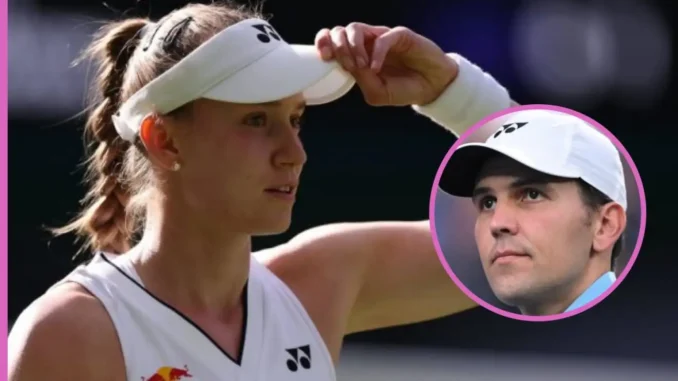
Elena Rybakina and Stefano Vukov Controversy Described as ‘A Completely Strange Story’ by Australian Open Player
The tennis world has been buzzing with conversations surrounding the dynamic between Wimbledon champion Elena Rybakina and her coach Stefano Vukov. Their professional relationship, which has seen significant highs, including Rybakina’s Grand Slam victory and her rise in the rankings, has now become the subject of scrutiny and speculation. A recent comment by an Australian Open player has added another layer to the debate, describing the situation as “a completely strange story.”
Rybakina, known for her calm demeanor and powerful playing style, has been one of the most promising figures on the WTA Tour. Her triumph at Wimbledon showcased her potential to be a dominant force in women’s tennis. However, her partnership with Vukov has drawn attention for reasons beyond their on-court success. While many view their collaboration as a critical component of her ascent in the sport, others have raised eyebrows at the dynamics of their interactions during matches, sparking questions about the nature of their relationship.
The controversy began gaining momentum when footage and observations from matches suggested moments of tension between Rybakina and Vukov. On several occasions, Vukov has been seen delivering animated and sometimes intense feedback to his player during matches. While such exchanges are not uncommon in tennis, where coaching styles vary widely, the tone and frequency of these interactions have raised concerns among fans and analysts alike.
An Australian Open player, who chose to remain unnamed, weighed in on the situation, calling it “a completely strange story.” According to them, the perceived dynamic between Rybakina and Vukov seems unusual, especially given the composure and grace Rybakina exudes on the court. They expressed surprise that such controversies could surround a player who has otherwise maintained a reputation for professionalism and focus.
For Rybakina, the scrutiny comes at a time when she is striving to solidify her position among the sport’s elite. Balancing the demands of intense competition with the added pressure of public opinion about her coaching relationship is no small feat. The spotlight on her and Vukov’s dynamic underscores a broader conversation in the tennis community about the role of coaches and the boundaries of their influence.
Coaching in tennis is a deeply personal and nuanced aspect of the game. Some players thrive under highly structured and intense coaching styles, while others prefer a more collaborative or laid-back approach. Vukov’s methods, though effective in many respects, have sparked debate about the fine line between constructive feedback and counterproductive intensity. Critics argue that overly aggressive coaching can undermine a player’s confidence, while supporters contend that such methods are sometimes necessary to push athletes to their limits.
Rybakina herself has largely avoided addressing the controversy in detail, opting instead to let her performance speak for her. Her recent results, including a strong showing at the Australian Open, indicate that she remains focused on her goals despite the distractions. However, her silence has also fueled speculation, leaving fans and commentators to interpret the situation based on limited information.
The unnamed Australian Open player highlighted the importance of understanding the unique dynamics of each player-coach relationship. They noted that what might seem unusual or problematic from the outside could, in fact, be a perfectly functional system for those involved. Still, they acknowledged that the public nature of tennis inevitably invites scrutiny, particularly when it comes to high-profile players like Rybakina.
This controversy also reflects broader issues in the world of professional sports. The relationship between athletes and coaches has always been a delicate balance, requiring mutual trust, respect, and effective communication. When these elements are called into question, it can create a ripple effect, impacting not only the individuals involved but also public perceptions of their partnership.
For Rybakina, navigating this storm will require resilience and clarity about her priorities. As a young player with immense potential, she has already demonstrated her ability to overcome challenges and stay focused on her game. The controversy surrounding her and Vukov is just another chapter in what is likely to be a long and successful career.
The tennis community, meanwhile, continues to debate the situation, with opinions divided on the appropriateness of Vukov’s coaching style. Some argue that his methods are a driving force behind Rybakina’s success, crediting him with helping her unlock her potential. Others believe that his approach could hinder her long-term development, emphasizing the need for a more supportive and balanced dynamic.
Ultimately, the future of the Rybakina-Vukov partnership will depend on their ability to navigate these challenges together. Whether they choose to address the controversy publicly or simply continue their work behind the scenes, their response will be closely watched by fans and analysts alike.
In the ever-evolving world of professional tennis, controversies like these are not uncommon. They serve as a reminder of the complexities and pressures that come with competing at the highest level. For Elena Rybakina, this “strange story” is a test of her ability to maintain focus and rise above distractions. For Stefano Vukov, it is an opportunity to reflect on his coaching style and its impact on his player.
As the tennis season unfolds, the spotlight will remain on Rybakina, not only for her performances on the court but also for how she handles the challenges off it. Whether this controversy becomes a turning point in her career or simply a footnote in her journey, one thing is clear: Elena Rybakina has the talent, determination, and poise to shape her own narrative in the world of tennis.
Leave a Reply